
How one Brighton restaurant, opened in 2020, has persevered through the pandemic on the strength of community, teamwork, and golden beef soup
6:38am
In the cold hours of morning, Wei Ding, the owner and top chef of My Happy Hunan Kitchen in Brighton, rises before dawn. He starts preparing dumplings for his wife YingHua Li and his two nine-year-old twins, Jean and Sean, and one-year-old Malaya.
Since the start of the pandemic, most restaurants have struggled to stay in business. About 20% of restaurants in Massachusetts have been forced to shut down. Many Chinese restaurants have also faced significant discrimination.
“My life has been completely changed by COVID-19,” Mr. Ding says. “Some customers truly believe that COVID-19 comes from China, so they refuse to come in Asian restaurants, especially Chinese restaurants.”
Wei Ding was once an award-winning chef in Changsha, Hunan Province, China. He was the executive chef of Huatian Hotel, a famous five-star hotel in Changsha, China. He founded his first restaurant in Changsha in 2010 called Happy Gathering and expanded to 15 locations across China. With this success, he and his family immigrated to Boston in 2016 with the hope of seeking better education in the future for their children.
My Happy Hunan Restaurant is a traditional Chinese restaurant and can accommodate more than 120 guests. On a typical day, about 60% of the people who come in are Asian, with 20% white, 15% Latin, and 5% Black.
7:45am
After breakfast, Wei Ding begins to send his kids to school.
Together, Wei Ding and his wife, YinHua Li, are an easy-going, happy couple with an affection for each other and for their work that runs deep. YinHua used to work the day shift at My Happy Hunan Kitchen, everybody in the restaurant knows her, but they’re expecting a new baby, so she has stopped going in and now helps by taking orders from home.
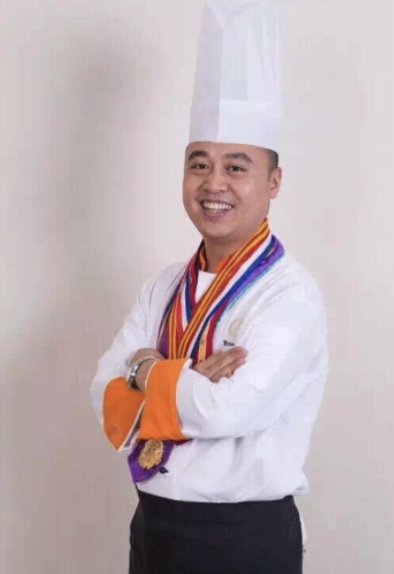
8:30am
Wei Ding arrives at the Chinese supermarket in Chinatown to purchase the ingredients for the day.
Ding has a good sense of humor, and within the Chinese community, many people know him. He doesn’t speak much English, but if you pass him on the street you’ll get a smile and a wave and maybe a funny joke or a greeting with a heavy Chinese accent, Hello, hello, how are you? Or, Thank you, thank you.
A round man with short sandy hair and the preoccupied air of someone who is always thinking about how to make great food, opening a Chinese restaurant has always been Ding’s American dream. At 16, while helping his grandmother prepare a Chinese Lunar New Year dinner, he fell in love with the process of making golden beef soup. The soup is a really special home-cooked dish. Made of beef, enoki mushrooms, pumpkin, and a peppery spice of red-hot chili peppers, it takes 24 hours to cook.
Ding promised himself that he’d become a famous chef and continue making his favorite recipe. Now, golden beef soup is the most ordered item at the restaurant. It is also his unique way of connecting to his heritage. He loves food and enjoys bringing people together, and it was important for him to create a restaurant environment that expresses the culture of Hunan in a friendly, authentic way.
9:30am
Wei Ding arrives at the restaurant and meets his co-owner De Wu to discuss the day’s work plan.
“Hey buddy, how are you?”
“Great! how are you doing?”
Wu is a tall, young head chef who wears his shirt tucked in and his hair combed neatly back from his forehead. He gets to the restaurant at about this time every morning. Wu immigrated to Boston in 2016 and worked as top chef at Sumiao Hunan Kitchen in Cambridge. In April 2020 he opened My Happy Hunan Kitchen with Ding; about a month earlier, Mass Gov. Charlie Baker called for all restaurants to shut down indoor dining, a cancellation that continued through the following fall.
Wu is lean and lanky. He has experienced the difficulties of working hard to achieve the American dream through many days of exhaustion, isolation, disillusionment, and a growing sense of frustration, but in spite of these challenges, he always remains positive. He is an indispensable partner to Ding.
“Every single day I will find a reason to be thankful and to have a smile on my face.” Wu says.
He also has a good sense of humor and a lot of folks save their best jokes for him, just to see his quick and sometimes mischievous-looking smile.
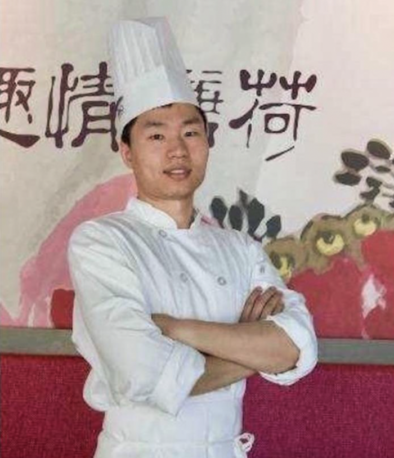 Wu has never had a chance to return to China since he came to the United States five years ago. He planned to visit in the summer of 2020, but the pandemic restricted his travel. As an only child, he feels the pressure of his parents’ desire to see him starting a family from thousands of miles away.
Wu has never had a chance to return to China since he came to the United States five years ago. He planned to visit in the summer of 2020, but the pandemic restricted his travel. As an only child, he feels the pressure of his parents’ desire to see him starting a family from thousands of miles away.
“If we don’t want to shut down, we have to find a way to survive—by increasing deliveries, by laying off some of the staff, and by reducing costs,” Wei Ding says.
During that critical period in 2020, they made the decision to lay off 60% of their staff so they could collect unemployment. Before the pandemic, Ding’s restaurant had 18 employees. Currently, the restaurant only has five workers in the back of the kitchen and one in the front. They hope to hire everyone back eventually.
The survival of the restaurant, from the worst days of the pandemic when all dining stopped to the present day, is a remarkable story. In order to keep the business alive, they formulated a special pandemic menu, and also increased their outside deliveries plus offered regular discount codes.
10:20am
The chefs are prepping ingredients for the day.
Wu and Wei Ding prepare the soy sauce, Chinkiang vinegar, Shaoxing wine, peanut oil, ginger, green onions, garlic, green chili, red pepper, and sour chili. They cook rice.
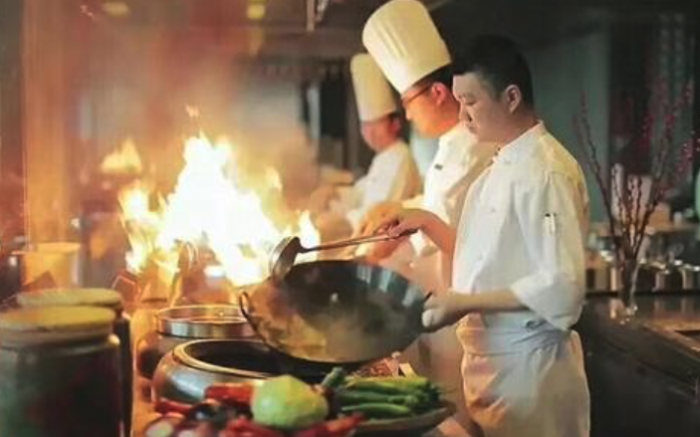
10:45am
Ding … ding … ding! The first order comes in.
“Golden beef soup, General Tso’s chicken (not spicy), stir-fried pork.” Delivery via Uber Eats.
Ding … ding … ding! The orders continue …
“Golden beef soup and Kung Pao chicken century egg.” Delivery to Lexington.
“Stir fried beef tongue (not spicy) and Jian Dui.” Delivery to Newton.
“Ginger and scallion chicken and pork soup Bao.” Delivery to Brookline.
“Stir-fried pork and stir-fried cauliflower.” Delivery to Brighton.
“Hunan fried rice and scallion pancake and plum juice.” Number 121. Order for pickup.
The promotions have attracted some customers, but their operating income is still low. Many of the restaurant’s costs remain fixed, including major expenses like rent, utilities, gas, sanitation, employee salaries, etc. So, money is extremely tight.
“No matter how difficult it is, we never give up. We are not shutting down,” Wei Ding pledges.
Ding and De Wu have worked more than 12 hours a day all through the pandemic. In order to save on labor costs, neither one has taken a day off for more than three months.
Wu’s right hand is swollen and causing him pain as he cooks, the beginnings of arthritis. Nobody seems to notice.
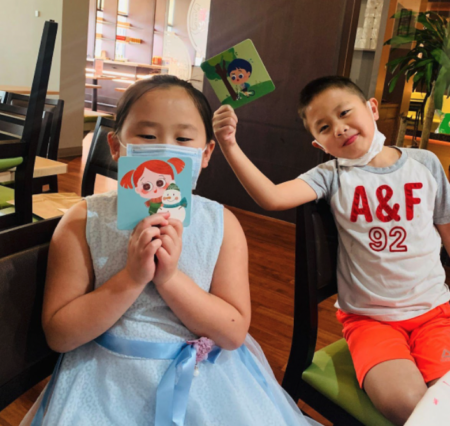 2:30pm
2:30pm
School pickup time.
Wei Ding rushes to his kids’ school ahead of 3pm pickup. He then returns to the restaurant with his children in tow to prepare 500 free lunches that My Happy Hunan Kitchen is providing the community with tomorrow.
Most Asian restaurants provide employees with free lunch and dinner. Normally, after taxes, their cooks pull in $4,500 to $5,000 a month, making approximately $60,000 a year. Waiters and cashiers can earn $2,500 to $3,500 a month, around $40,000 a year. However, during the pandemic, something changed. The restaurant’s income dropped by 80%.
“We love the Happy Hunan Kitchen restaurant. Don’t close!” a customer says.
“You are not alone; we are always here for you,” Zhang, a Chinese student, says.
“Thank you for still being there for us!” Andrew says.
“It’s not just the food, it’s the Chinese culture,” says Apple Li, another customer. Li, a Chinese professor at Harvard Graduate School of Education, is among several regulars who have given large tips in the several-hundred dollar range to support the restaurant.
“We’re incredibly grateful for our customers who keep us going every day.” Wu says.
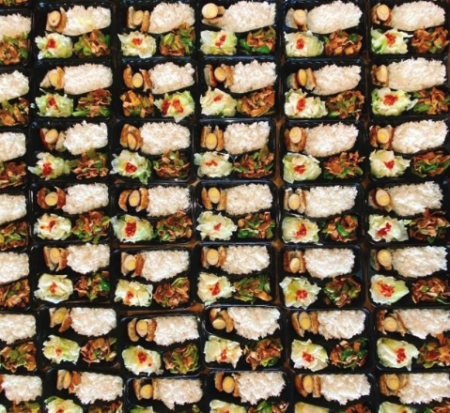
In order to thank its community and customers, over the last 10 months, My Happy Hunan Kitchen has donated more than 500 free lunches to healthcare workers, the fire department, and to international students. There are five schools in the Boston area that have accepted the free lunches: Harvard, MIT, BU, BC, and Emerson.
3-5pm
During the busy takeout hours, Wu hops in his car with bags of warm food and delivers them to customers. Few know he co-owns the restaurant when he hands over the food.
“Life in the United States is good and bad. Have to pay for the harvest!” Wu says.
He clarifies that “have to pay the harvest” is a Chinese expression that means, essentially, “no pain, no gain.”
Ms. He is a 60-year-old waitress who spends seven days a week in the kitchen. She is from Fujian, China, a province on the country’s southeastern coast. He, who’s wearing traditional white waitress clothes, is a small, enthusiastic, pale, and pretty woman, with a quiet, satisfying smile and a light in her eyes. She helps cut vegetables and meat, washes dishes, and cleans up around the restaurant. She never complains and has been the most effective helper at the restaurant through the pandemic.
Amanda Izzo is a young, talkative woman with strawberry-blond hair and a quick laugh. She is the only American woman left in the restaurant, and she also works 12 hours a day. She is a cashier, as well as a waitress and translator who helps fill takeout orders. She has been deeply influenced by the Chinese community around her, and says she enjoys working at My Happy Hunan Kitchen. The job, she adds, has provided all the income for her and her family.
“Whether it’s a takeout order, a compliment to the chef, a positive review, or a high-five for a team member they’ve been missing, these little things add up to have a huge impact on their ability to stay strong,” Amanda says.
6:30pm
It’s a busy day for Wei Ding and his staff. He works in a big square kitchen with four stoves burning at the same time.
Ding says, “There are hundreds of cooking methods in China, but the most common methods are stir-frying, deep-frying, shallow-frying, braising, boiling, steaming, and roasting. I like stir-frying the best and I use a wok at high heat, adding plenty of oil followed by all the ingredients and seasonings.”
The stir-fried meat is juicy and tasty, the vegetables tender and crispy.
Ding … ding .. .ding! The orders are rolling in.
“General Tso’s chicken.” Delivery with Panda.
“Stir-fried pork with long hot pepper and edamame.” Delivery via DoorDash.
“General Tso’s chicken.” Number 157. Order for pickup.
By the time Wu walks back into the kitchen after delivering, they have 36 orders. The estimated gross income for the day will be around $8,000. For the understaffed restaurant, it’s a successful outing.
7:45pm
Delivery to Boston.
8:15pm
Delivery to Cambridge.
8:40pm
Delivery to Newton.
9:10pm
Delivery to Chinatown.
9:32pm
Delivery to Belmont.
9:50pm
Delivery to Burlington
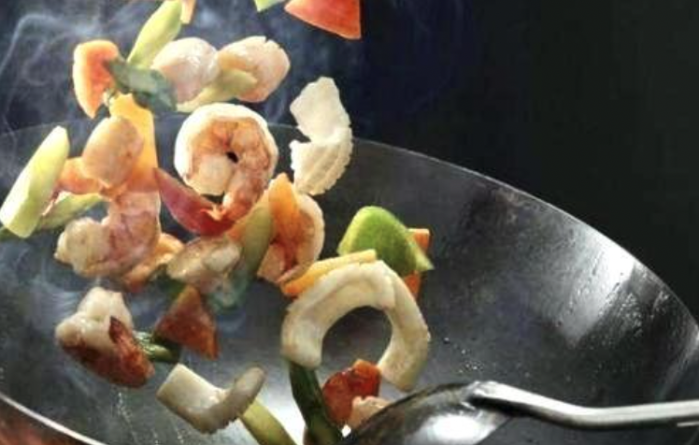
10pm
Ding … ding … ding! The last orders roll in.
“Golden beef soup and stir-fried pork with long hot pepper.” Order for pickup as soon as possible.
Back in the kitchen, Ms. He cleans the stove; Amanda washes the floor. Wu prepares tomorrow’s food list.
10:50pm
It’s time to go home.
Wei Ding turns off all the lights and leaves.
The restaurant is a half-hour drive from his house, but first Ding and Wu head to a Japanese bar close to My Happy Hunan Kitchen for a beer to relieve stress. They just want to relax, even if it’s just for a few minutes.
11:28pm
Ding arrives at home, showers off the kitchen grease, prepares tomorrow’s breakfast ingredients, and goes to sleep knowing he will do it all over again the following day.
Wenjing is a journalist studying at Emerson College

